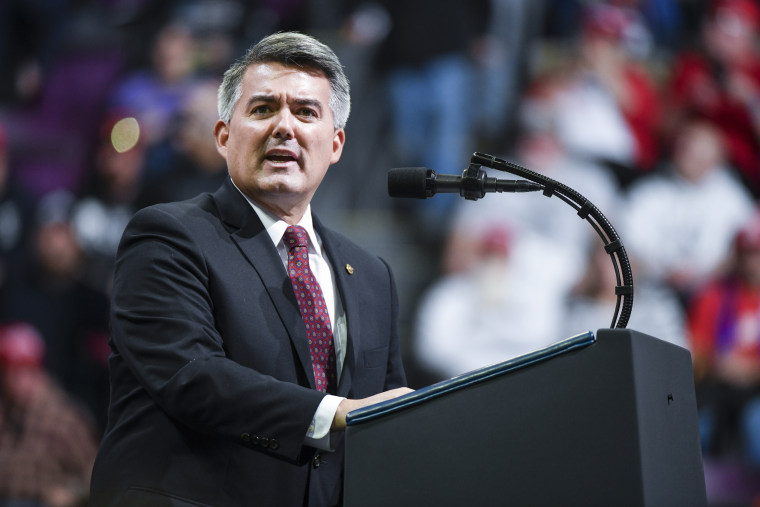WASHINGTON — Sen. Cory Gardner ran his first Senate campaign railing against the newly enacted Affordable Care Act, but six years later, the once-maligned law is getting little mention in his bid for re-election.
The Colorado Republican isn’t alone.
After years of campaigning against Obamacare, Republicans trying to retain control of the Senate appear to be conceding that attacking the ACA is no longer politically advantageous, a shift compounded by the millions of people who now depend on the law for their coverage, including protections for pre-existing conditions.
“Now with Obamacare being entrenched into people's daily lives, they just don't want their health care messed with, and so it becomes hard for Republicans to articulate on that point,” said Doug Heye, who worked on repeal efforts in 2014 as deputy chief of staff to then-House Majority Leader Eric Cantor, R-Va.
The coronavirus pandemic has also shifted the way Americans are talking about health care, pivoting to masks and vaccines instead of insurance mandates. And Republicans have had some success in chipping away at the law, including eliminating the individual mandate that required all Americans have health insurance.
But in his first term in office, President Donald Trump has given Republicans few health care policy wins to campaign on, repeatedly promising a new plan and then failing to deliver. While Democrats have seen some in their party embrace a move to a government-run health system, referred to as "Medicare for All," Democratic presidential nominee Joe Biden has been a vocal opponent and, instead, has pushed for his party to improve the ACA.
Health care remains one of the most important issues cited by voters in polls. After Republicans rode an anti-Obamacare message to wins in 2010 and 2014, Democrats embraced protecting the law as a winning message in 2018 that helped them take control of the House.
Republicans are still happy to talk about health care, but they are opting to put their focus on what they say is a shift to the left and an embrace of socialized medicine.
Gardner — whose opponent, former Colorado Gov. John Hickenlooper, holds a narrow lead in recent polls — voted to repeal the law but has shifted his health care messaging.
In 2014, Gardner ran an ad attacking his Democratic opponent, then-incumbent Sen. Mark Udall, for supporting the law. Gardner's political allies spent millions blanketing Colorado airways with health-care focused messages.
This year, Gardner’s campaign ads have focused on securing personal protective equipment, the coronavirus, the environment and helping establish a national suicide hotline. He poked fun at his opponent for owning a brewery, not mentioning his position on health care.
“Democrats want to replace the Affordable Care Act with socialized medicine,” Gardner told the Colorado Sun in an interview earlier this month. “I don’t want that.”
'Running scared'
In May, Victoria Spartz, a Republican candidate for Congress in Indiana, ran an ad showing her walking down a hallway flanked by two men in white coats, proudly touting that she "fought Obamacare."
After winning the Republican primary, Spartz’s ads in August showed the same footage, but this time, "Obamacare" had disappeared. In the same place, the words "major health care reform" appeared.
Spartz is running in a competitive race: Even though Trump won the district in the Indianapolis suburbs by 12 percentage points in 2016, the seat is considered a toss-up, according to the Cook Political Report.
Asked about House Republicans’ message on health care this year, National Republican Congressional Committee spokesman Michael McAdams did not say anything about the ACA.
“House Republicans are fighting to preserve Americans’ health care, while House Democrats have made it their priority to abolish private health insurance, increase costs and force the country into a one-size-fits-all government-run system that will lead to worse care,” he said in a statement.
Trump is doing little to infuse health care discussions into the race.
The president’s campaign ads between July 15 and Aug. 9 were about crime, taxes, immigration, trade and protests and riots, according to the Wesleyan Media Project, which tracks political advertising.
During that same period, Biden ran ads focused on COVID-19, the economy, business, jobs and health care.
Erika Franklin Fowler, co-director of the ad-tracking project, said Obamacare has increasingly become popular among Americans.
While Republicans previously ran on an anti-Obamacare platform, they were unable to deliver when Republicans controlled Congress for the first two years of Trump’s presidency, she said.
Senate Majority Leader Mitch McConnell, R-Ky., has made repeated attempts to repeal the law. Under his leadership, Senate Republicans spent the summer of 2017 trying to pass a plan to dismantle the ACA, but after multiple votes on different proposals, their efforts collapsed.
Trump is still trying to dismantle it behind the scenes. The administration asked the Supreme Court in June to overturn Obamacare, and the court is expected to hear oral arguments in the case this fall.
But the public appears to be settled in their views. An NBC News/Wall Street Journal poll in March found 42 percent of voters said the law is a good idea. Thirty-five percent, meanwhile, said it’s a bad idea, and 23 percent said they didn’t have an opinion.
“The threats of taking something away once it becomes more real, I think, have improved the public opinion about the ACA,” Franklin Fowler said. “I think also the fact that so many people are losing their jobs, and therefore also their health insurance, sort of lays bare some of the challenges about employer-based insurance.”
Rep. Cheri Bustos, D-Ill., chairwoman of the Democratic Congressional Campaign Committee, said in a phone interview with NBC News that House Democrats are repeating their strategy from 2018, pushing the benefits of the Affordable Care Act. She didn’t see an embrace of the calls for Medicare for All, despite Republican claims.
“The American public sees us as the party of health care,” Bustos said, referring to Trump’s April suggestion that a disinfectant might eliminate the coronavirus. “They're running scared on this issue, and they should be.”

